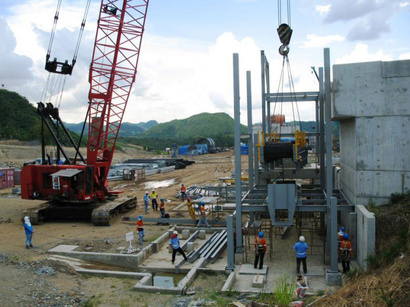Over $43 mln allotted for construction of gold leaching plant

By Nigar Orujova
Anglo Asian Mining, a company extracting precious metals in resource-rich Azerbaijan, has attracted another loan from the International Bank of Azerbaijan (IBA) for tank leaching plant construction in the Gadabay region, located 420 km from the Azerbaijani capital Baku.
Anglo Asian Mining plc is a cash generative and profitable gold and copper mining and exploration company, which started gold and silver production in May 2009 and copper concentrate production in 2010 at the Gadabay gold and copper mine located in northwestern Azerbaijan.
"The final stages of the vat leaching plant construction will be financed through a $25.5 million loan," the company said in a statement.
Taking into account both the current and previous loans, the company has attracted a total of $43.5 million from the IBA for the plant construction.
The IBA previously presented a letter to the company expressing its intention to allocate a total of $60 million for the project. The total cost of the construction work including design and commissioning is expected to be $52-54 million.
Under a relevant agreement, the annual interest rate on the loan, which will be repaid on a quarterly basis, is 12 per cent. Repayment of the loan will begin within two years after the receipt of each tranche, implemented in 12 equal quarterly payments, and must be completed within 36 months.
By the end of last year, Anglo Asian Mining had spent $29.6 million of the received funds.
The new plant, which will be built in the Gadabay gold and copper deposit area, is planned to be commissioned next March. Construction work has been launched.
The new plant, which is designed to process 100 tons of ore per hour, will process ore and resources not suitable for heap leaching - a method of obtaining gold from ore that is currently in use at the field. Vat leaching technology allows extraction of more than 90 percent of gold contained in treated ore, compared to about 70 percent obtained through heap leaching.
According to preliminary estimates, gold recovery at the plant is expected to reach 85 percent in oxide ore and 69 percent in sulfide ore.
Anglo Asian Mining has the rights to develop six deposits in the south-west of Azerbaijan -- Gadabay, Ordubad, Gosha Bulag, Gyzyl Bulag, Vezhnali and Soyutlu, based on a production sharing agreement signed in August 1997 with Azerbaijan's government.
Under the agreement, it is planned to produce about 400 tons of gold, 2,500 tons of silver and 1.5 million tons of cooper.
Anglo Asian Mining President Reza Vaziri said earlier that the company plans to produce 80,000 to 85,000 ounces of gold in 2013 and 95,000 to 100,000 ounces in 2014.
Vazari added that due to the very cold winter, production figures are lower than planned, therefore, the company revised down the projection to 49,000-51,000 ounces in 2012. He also noted that 57,000 ounces were produced in 2011.
With the new plant's launching in 2013 Anglo Asian Mining plans to boost production at the Gadabay deposit to 67,000-70,000 ounces of gold.
In the second half of 2013 Anglo Asian Mining plans to start production at the Gosha Bulag deposit and to produce 15-20,000 ounces of gold there until the year-end, and up to 25,000 ounces in 2014. The company also expects to increase silver and copper production, and by the end of 2013 it intends to extract 26,000 ounces of silver and 600 tons of copper at Gadabay.
According to the PSA agreement, since 2009, the company has transferred 22,000-23,000 ounces of gold out of the 180,000 ounces produced to the Central Bank of Azerbaijan, Vaziri said.
"Since the start of our activity we have operated with a profit. In 2011 our after-tax profit was $21 million. We expect $15-20 million profit in 2012, and in 2013 the profit will increase," Vaziri said.
The produced gold and silver are sent to Switzerland for refining, and gold bars are delivered to the country and preserved by the government.
Here we are to serve you with news right now. It does not cost much, but worth your attention.
Choose to support open, independent, quality journalism and subscribe on a monthly basis.
By subscribing to our online newspaper, you can have full digital access to all news, analysis, and much more.
You can also follow AzerNEWS on Twitter @AzerNewsAz or Facebook @AzerNewsNewspaper
Thank you!
